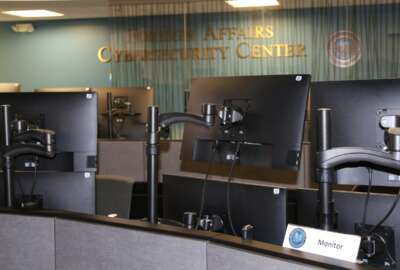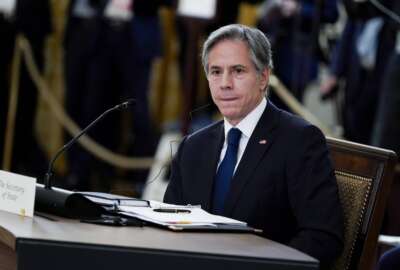 Exclusive
Exclusive  Exclusive
Exclusive Hubbard Radio Washington DC, LLC. All rights reserved. This website is not intended for users located within the European Economic Area.
The new year brought the opening of a new office at the State Department. It's called the Special Envoy for Critical and Emerging Technology. It has a list of r...
The new year brought the opening of a new office at the State Department. It’s called the Special Envoy for Critical and Emerging Technology. It has a list of responsibilities. To explore the topic further, Federal Drive with Tom Temin spoke with the ambassador at large himself, Nathaniel Fick and the deputy envoy, Dr. Seth Center.
Interview transcript:
Tom Temin
Special Envoy for Critical and Emerging Technology. What is that? What is the goal and purpose of this new office, Ambassador Fick?Nathaniel Fick
So the purpose of the office is to integrate and elevate the United States approach to technology, diplomacy all around the world. We’re involved in a global competition in everything from cybersecurity, to trusted telecommunications, to quantum computing to biotechnology. And this is an effort to make sure we have senior diplomatic representation that we’re getting the United States engaged in leading in all of these technology areas around the world.Tom Temin
I guess I need a little more sharp definition of technology ambassadorship, because I think of it as a national security negotiation, sometimes, or a trade issue dealing with the ant group, or TikTok or this kind of thing, or the issues surrounding the Chinese telecommunications gear. So maybe give us a picture of what it is how we do diplomacy in these particular domains.Nathaniel Fick
I’m glad you raised that Tom, I was a Marine earlier in my career. And so many of my formative experiences were on the national security side of things. And I think it’s essential that we not over securitize technology, out of the gate. It’s these are issues of national security, there are issues of economic competitiveness, as you say. But there are also issues that sort of fundamentally affect how citizens live their lives all over the world. And I have a deep and abiding belief that diplomacy must be the nation’s tool of first resort. And so this is an effort the office and this work, are an effort to put diplomacy at the forefront in how the United States engages on technology around the world.Tom Temin
All right. And Dr. Center, what are some of the resources and people and other things you’re bringing to the setting up of this office and making it operational?Seth Center
Sure. So let me just set the stage briefly. Put this in a little bit of a larger context. When Secretary Blinken came into office, and we looked at the broad challenges facing the United States and the world, and the structure and organization of the department. It looked like a natural time to make sure that we had the workforce, the focus on these issues that includes cyberspace, emerging technologies, that also includes a global health agenda. And so the secretary asked first to make sure that we had the right ideas, the right strategies, the right frameworks in place.And then once we’ve had that to make sure we had the right organizations in place, and there’s two stories here that are important. One is the story of a relatively mature field of cyberspace, cybersecurity, digital diplomacy. And then there’s a newer space surrounding the adjacent critical technologies that the administration has prioritized biotechnology, micro, electronics, artificial intelligence, quantum computing, as Ambassador Fick mentioned. And what we decided is we needed to bring together the different parts of the organization that are thinking about these issues through the security lens, through the economic lens, through the lens of how they impact our societies. And make sure we have a coordinated approach to explain to our allies and partners how these issues relate to one another, what a positive vision is, how their positive vision relates to the harder national security challenges. And so we have a small office that reports to the leadership that does that integration and leadership, some of the forecasting to explain and relate these critical technologies to our diplomacy.
Tom Temin
And will this effort involve actual what we think of diplomacy, which is face to face discussions with similar people from other nations?Nathaniel Fick
I live on an airplane Tom, and we spend a lot of time doing exactly that. I’ll give you a couple examples. So back in the fall, there was an election for the leadership of an international organization called the International Telecommunication Union. And this is one of those organizations that we all depend on and nobody’s heard of. And it was started in 1865, to make sure that European telegraph’s and North American telegraph’s and Asian telegraph’s operated on the same standard so they can communicate, and that same mission of interoperability is extended all the way down into the digital era. And so now the mission of the ITU is conduct digital connectivity, advancing inclusive, interoperable, secure digital connectivity for people all around the world. And there was an election between an American woman to become the secretary general of the ITU and And a Russian candidate, who had been a deputy minister of telecommunications in Russia. And before that was an executive at the Chinese Telco Huawei, and those two candidates had very different visions of the world, and how technology should be used. And so we were on the ground in Bucharest, Romania, meeting with delegations from all around the world collecting votes for the American candidate, and she won in a landslide. So face to face diplomacy is very much a part of this.Tom Temin
We are speaking with Ambassador at large Nathaniel Fick, and Deputy Envoy Dr. Seth Center, both of the State Department’s new Special Envoy for Critical and Emerging Technology. And I just want to get back to what kind of resources you have, it’s not just you two doing all this all by yourself?Seth Center
Right. So there was a major effort across actually this administration and the previous one, to make sure that there were substantial new personnel resources devoted to all of these areas. And so Ambassador Fick, in the context of standing up a new bureau, the Bureau of Cyberspace and Digital policy, the Hill combined with the State Department created, dozens of new positions for critical and emerging technology, we’ll have multiple positions. And that includes positions across the State Department to deal with these issues on a security side, on a human rights side. So we’re building capacity throughout the department on the personnel side. And this is really adjacent to the efforts that are going on in other parts of the national security enterprise to build that same kind of knowledge and capacity. So it’s part of a much larger story.Nathaniel Fick
In addition to people, we have foreign assistance dollars Tom, so we can spend money around the world on things like building capacity in cybersecurity, training people to develop, deploy and use these technologies in ways that are respecting of human rights and inclusive.Tom Temin
Yeah, that raises a question I wanted to ask you to. In some countries, technologies that we use here for open purposes, are often used on their head to keep people oppressed and to monitor and surveil people, in ways that we would not consider nearly acceptable in the West and the United States, is that part of the diplomatic sort of effort to maybe, as you mentioned earlier, change people’s minds?Nathaniel Fick
It is, I mean, as you say, there are there are different views of how technology should be used by governments. And we are advancing a view that is based on a foundation of American values and our respect for human rights. And so it infuses everything we do every every aspect of the policy. And we think it’s really important that we not only see things through a lens of competition with China or Russia, but that we articulate a positive, compelling, attractive, affirmative vision for the role of technology and societies so that people can join us because we can’t do this alone. We need to, it’s the proverbial Big Ten. And, we want large groups of countries viewing and deploying technologies in ways that we do.Tom Temin
All right, and just for other people in the government, you two present kind of the classic situation of career and recently appointed, working together to try to get something done. And I just want to get a quick indication of your backgrounds. Dr. Center, we’ll start with you. You’re the career guy on this duo, Correct?Seth Center
So in the past, I was a civil servant in the State Department of the National Security Council on the staff there across two administrations, I briefly left government to work at a couple of think tanks. Came back to something called the National Security Commission on Artificial Intelligence, which is was a congressionally established government entity.Tom Temin
Know it well.Seth Center
So I’ve been in and out, but in a nonpartisan way, and as a civil servant, that’s right.Tom Temin
And Ambassador Fick, you are new to government, well, in the Marine Corps not withstanding, it’s better to travel by State Department jet than Osprey, I suppose. But you are new in this sense to the government?Nathaniel Fick
Oh, yeah. After a stint in the Marines after college, I spent the bulk of my career in venture capital and in company building, and I built a technology business in the cybersecurity space. And so really jumped at the opportunity to get back to public service and the security guards of the State Department laugh at me because I skipped through the turnstile in the morning. I’m just incredibly grateful to be here and to be a part of this bigger mission.Tom Temin
And that big clock on the wall there. Is that working way up high, like that airport style clock in a lobby?Nathaniel Fick
It is actually, yes. And I use it, I reference it sometimes to say that we’re in a race with respect to these technologies. And we should all hear physically and metaphorically, the ticking of that clock.Tom Temin
And just a final question. It seems like you have support from the very top from Secretary Blinken. And that’s kind of an important ingredient to for carrying forward, isn’t it that that level of support?Nathaniel Fick
Absolutely. Our efforts report directly to the deputy secretary of state. We have incredible support, both in terms of resources and also kind of moral support. This is one of the secretary’s top priorities. And we really appreciate the endorsement and support that we’ve gotten. It makes everything possible.
Copyright © 2024 Federal News Network. All rights reserved. This website is not intended for users located within the European Economic Area.
Tom Temin is host of the Federal Drive and has been providing insight on federal technology and management issues for more than 30 years.
Follow @tteminWFED
 Exclusive
Exclusive 
